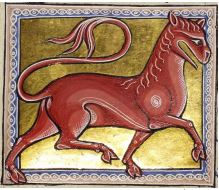La referencia teológica y doxológica a la Resurrección y al Pentecostés según las oraciones de Gregorio Nacianceno XLI y XLV
Article Sidebar

Main Article Content
En la cuadragésima primera oración, Gregorio de Nacianceno analiza la divinidad del Espíritu Santo, tema que vuelve a desarrollar con más severidad en su Quinta Oración Teológica. Gregory intenta establecer el punto mediante un conjunto de argumentos bastante diferente de los adoptados en el discurso anterior, ninguno de cuyos puntos se repite aquí. En la otra oración, cuarenta y cinco, Gregorio se refiere a la importancia de la resurrección para la raza humana. Presenta a Cristo como el nuevo Adán que salvó al humano de la muerte y vuelve a reunir al hombre con Dios. Este es un tema al que se hace referencia también en la oración cuarenta y uno. En este artículo, examinaremos la enseñanza de Gregorio de Nacianceno sobre el estado divino del Espíritu Santo y su igualdad con las otras dos personas del Dios Trino a través de
imágenes teológicas y bíblicas. También presentaremos cómo conecta su enseñanza para la antropología basada en la cristología. Al final, mostraremos cómo Gregory produjo estas oraciones para festivales públicos dentro de la tradición literariamente madura de la
retórica de las fiestas paganas, pero le da a sus oraciones un contenido teológico.
Article Details
ARTEMI, EIRINI, ‘The triadological teaching of Gregory Nazianzen about God in his twentieth
Oration On Theology and the office of Bishops’, 25.3.2014. IDEM, ‘Gregory Nazianzen’s trinitarian teaching based on his Twentieth Theological Oration’, De Medio Aevo 4.2 (2013), pp. 127-146.
ARTEMI, EIRINI, ‘Τhe knowledge of the Triune God according to Isidore of Pelusium’, Vox
Patrum 34 (2014), t. 61, pp. 327-342
BEELEY, CHRISTOPHER, Α., ‘The Holy Spirit in the Cappadocians: Past and Present’, Modern
Theology 26:1 (2010), pp. 90-119
BEELEY, CHRISTOPHER, A., ‘The Early Christological Controversy: Apollinarius, Diodore, and
Gregory Nazianzen’, Vigiliae Christianae, 65.4 (2011), pp. 376-407.
BEELEY, CHRISTOPHER, Gregory of Nazianzus on the Trinity and the knowledge of God. In Your Light We Shall See Light, Oxford Studies in Historical Theology, (Oxford, 2013).
BROWNE, CH. G., SWALLOW, J. ED., From Nicene and Post-Nicene Fathers, Second Series, Vol. 7, ed. by PH. SCHAFF, H. WACE, (Buffalo - New York, 1894).
BUCHINGER, H., Pascha bei Origines: Systematische Aspekte (Innsbruck, 2005).
DRAGAS, GEORGE, ‘Orthodox Ecclesiology in Outline’
FILIAS, GEORGE, Tradition and Development in the Worship of the Church, (Athens, 2014).
FILIAS, GEORGE, Studies of History and Theology of Orthodox Worship, (Athens, 2002).
FOUNTOULIS, JOHN, Issues about Liturgy, (Thessaloniki, 1977).
FYLAKTOS, CONSTANTINOS – DAMASKINOS, Historical and Theological Aspect of Anaphora
(Eucharistic Prayer) of the Divine Liturgy of St. Gregory the Theologian, (Athens, 2016).
GALLAY, PAUL, La vie de Saint Grégoire de Nazianze, (Lyon – Paris, 1943)
GIULEA, DRAGOS ANDREI, ‘The Cappadocian Paschal Christology: Gregory Nazianzen and Gregory of Nyssa on the Divine Paschal Image of Christ’, ZAC 12 (2009), pp 477-503, esp. p. 478, ref. 3, Doi 10.1515/ZAC.2008.029.
HOFER, ANDREW, O.P, Christ in the Life and Teaching of Gregory of Nazianzus, (Oxford, 2013).
‘In the name of the Father and of the Son and of the holy Spirit’, CATECHISM OF THE CATHOLIC
CHURCH.
LOUDOVIKOS, NIKOLAOS, “person instead of grace and dictatedotherness: John Zizioulas’
finaltheological position”, The Heythrop journal XLVIII (2009), pp. 1–16, esp. p. 8, DOI:
10.1111/j.1468-2265.2009.00547.x
LOSSKY, VLADIMIR, The Mystical Theology of the Eastern Church, (New York, 2002).
MATZ, BRIAN, Gregory of Nazianzus, series: Foundations of Theological Exegesis and Christian
Spirituality, (Grand Rapids, 2016).
NACHEF, ANTOINE, Mary: Virgin mother in the thought of the Cappadocian Fathers, Doctoral
Dissertation, International Marian Research Institute University of Dayton, (Ohio, 1997).
NOBLE, THOMAS A., ‘Gregory Nazianzen's use of Scripture in defence of the deity of the Spirit’, Tyndale Bulletin 39 (1988), pp. 101-123.
NOBLE, THOMAS A., The Deity of the Holy Spirit according to Gregory of Nazianzus, (Edinburgh, 1989).
OPPERWALL, DAVID G., The Holy Spirit in the life and writings of Gregory of Nazianzus, (McMaster University, 2012).
PAPADOPOULOS, STYLIANOS, Patrologia, 2, (Athens, 1990)
PAPADOPOULOS, STYLIANOS, Gregory Theologian and the presuppositions of his pneumatological
teaching, (in greek), (Athens, 1989).
Artículos más leídos del mismo autor/a
- Eirini Artemi, La Virgen María, Theotokos, y Cristo, verdadero Dios y verdadero Hombre. El misterio de la Encarnación según Cirilo de Alejandría , Mirabilia: electronic journal of antiquity and middle ages: Núm. 17 (2013): July-December: Mulier aut Femina. Idealism or reality of women in the Middle Ages
- Eirini Artemi, "Conocimiento" del hombre y de la "ignorancia" de Dios en la enseñanza de Gregorio de Nisa y Nicolás de Cusa , Mirabilia: electronic journal of antiquity and middle ages: Núm. 19 (2014): Nicholas of Cusa (1401-1464) in Dialogue
- Eirini Artemi, Clemente de Alejandría (c. 150-215) y el uso de metáforas y mitos musicales en sus textos , Mirabilia: electronic journal of antiquity and middle ages: Núm. 28: The Medieval Aesthetics: Image and Philosophy
- Eirini Artemi, La pneumatología de Gran Basilius en su tratado a Amphilochius Iconium , Mirabilia: electronic journal of antiquity and middle ages: Núm. 25 (2017): Idea and image of royal power of the monarchies in Ancient and Medieval World
- Eirini Artemi, El conocimiento de la Medicina en los escritos de Basilio de Cesarea , Mirabilia: electronic journal of antiquity and middle ages: Núm. 32 (2021)
- Eirini Artemi, El papel de Éfeso en la Antigüedad Tardía desde el período de Diocleciano hasta 449 d. C. El Concilio de los ladrones , Mirabilia: electronic journal of antiquity and middle ages: Núm. 26 (2018): Society and culture in Portugal
- Eirini Artemi, Moisés y la gnoseología de Dios, según la interpretación de Gregorio de Nisa en Canticum Canticorum , Mirabilia: electronic journal of antiquity and middle ages: Núm. 20 (2015): Art, Criticism and Mysticism
- Eirini Artemi, John of Damascus and the use of the letters of Paul in his writing An Exact Exposition of the Orthodox Faith , Mirabilia: electronic journal of antiquity and middle ages: Núm. 24 (2017): Manifestations of the Ancient and Medieval World